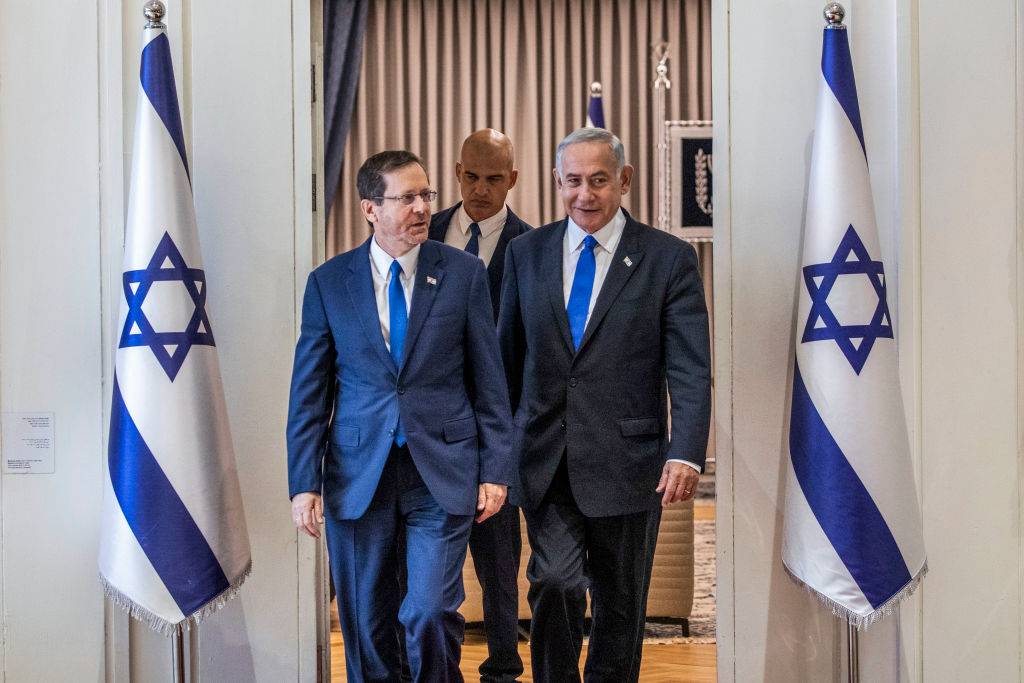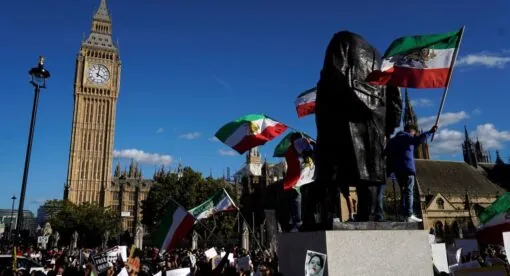The recent Israeli elections, which brought the far-right Religious Zionist Party further into the mainstream, have sparked concern among policymakers across the Arab world. The Religious Zionist Party includes elements of far-right, religious extremist, and ultra-nationalist political ideologies; David Rosenberg, an editor of the Israeli newspaper Haaretz, recently wrote that it is primarily characterized by a belief in Jewish supremacy and anti-Arab racism.
Israeli President Isaac Herzog acknowledged “the whole world is worried” about the new coalition, led by former Prime Minister Benjamin Netanyahu, that includes the likes of Itamar Ben Gvir and Bezalel Smotrich – both of whom have been arrested (and Ben Gvir charged) on account of inciting violence, and have actively encouraged support of perpetrators of terrorism. Ben Gvir has long agitated against any peace with Palestinians; he was even a key organizer of “Death to Rabin” rallies prior to the eventual assassination of former Prime Minister Yitzhak Rabin in response to his signing of the Oslo Accords. And both Ben Gvir and Smotrich have been active participants in the repression of Palestinians, such as during crackdowns in Sheikh Jarrah. Under immediate threat, Palestinians on both sides of the Green Line are bracing themselves for increasing violence and repression as politicians known for inciting hatred and terrorism join the Knesset.
The elections have implications for the future of the Abraham Accords, which normalized ties between Israel and the UAE, Bahrain, Sudan, and Morocco. The signatories of the Accords have thus far not commented officially on the election results, but pundits and analysts close to Arab regimes have expressed alarm at the intensity of racism represented by the Religious Zionist Party. One prominent Emirati analyst wrote:
Racist settler parties that hate Arabs and raise the slogan of death to the Arabs and believe in the superiority of the Jewish race and that every inch of Palestine is the divine right of the Jewish people will now rule Israel under their leader Netanyahu for years to come. I think it is appropriate to freeze the Abrahamic Agreement temporarily, and I hope that Netanyahu and those with him will not set foot on the land of the Emirates.
While it is unlikely that Abraham Accords signatories will change any official policy of normalization with Israel, the outrage sparked by the recent Israeli elections is indicative of broader trends that are important to note: specifically, that the Abraham Accords have been deeply unpopular with Arab societies in signatory countries. Arab societies did not buy the idea that this was an attempt at peace, given that the Palestinian conflict remained unresolved. The fact that the Accords were pushed by the same U.S. administration that proposed economic development in lieu of a Palestinian state did not help matters, and some aspects remain hard to stomach, even for officials within these regimes.
Nevertheless, the U.S. State Department recently celebrated the two-year anniversary of the Accords and expressed U.S. backing for future expansion of the agreement. Of particular note to the U.S. was the creation of the Negev Forum, a regional cooperation framework between the signatories that Israeli officials describe as “the beginning of a regional alliance.” Images of Arab and Israeli policymakers together in the Negev desert, and later in Manama, have been widely shared in both American and Arab media. While the State Department apparently noted to participants of the Forum that their work was not a substitute to resolving the Palestinian question, it was clear to everyone involved as well as to onlookers that the Palestinians had been entirely sidelined. With all this fanfare, it is easy to miss what the State Department omits from this narrative: namely, where the citizens of these countries actually stand.
Arab Public Opinion on Normalization
Often U.S. policymakers assume that Arab citizens, and what they think, don’t really matter. This is doubly the case for citizens of the Arab Gulf states. Policymakers assume that Gulf governments have a strong grip on society, and when political leaders make foreign policy decisions, loyal and obedient Gulf societies will just accept – if not immediately then eventually.
But such assumptions are not rooted in reality. Uprisings have repeatedly erupted across the region, even in the heart of the Arab Gulf. Arab citizens are not acquiescent, and dissatisfaction with the representativeness of policy has broader ramifications on the stability of these states, as well as social conflict.
Secondly, polling from the Arab Opinion Index shows that the Abraham Accords, and normalization deals more generally, are highly unpopular. In the last wave of the Index, 88% of respondents surveyed across 13 different countries opposed diplomatic recognition of Israel, and 79% viewed the Palestinian cause as important to Arabs generally, not Palestinians alone. This was the case even in the supposedly acquiescent Gulf countries, such as Qatar and Saudi Arabia. Finally, even in polling by organizations sympathetic to the Accords, such as the Washington Institute for Near East Policy, only a minority of respondents polled in Bahrain and the UAE supported the recent peace deals between their governments and the state of Israel.
This sentiment is deep-seated and widespread because Arab citizens do not believe recognition of Israel can come before fulfilling the Palestinian demand for self-determination. Diplomatic recognition of, and cooperation with, the state of Israel before such a resolution is seen then not as a form of peace but rather a form of defeat. From the Arab citizen’s perspective, the Abraham Accords do not resolve the Arab-Israeli conflict but rather solidify the conditions of occupation, repression, and displacement that characterize Israel’s policies toward the Palestinians.
Illiberal Peace
Given these conditions, the concept of illiberal peace – the cessation of conflict in a way that sustains illiberal institutions or maintains structural violence – is useful in describing and understanding the Abraham Accords. States engaging in illiberal peace rely on authoritarian conflict management to maintain control, using repressive force, rather than negotiation or a willingness to address the root of a conflict, to prevent or stifle violent dissent. Repression to stifle alternative viewpoints, the spread of propaganda to alter public opinion, and intervention in the economy to benefit “loyal clientelist groups” as well as maintain political stability are all tactics used within this framework.
Analyzing the Abraham Accords in this light helps illuminate effects that have been otherwise underemphasized or ignored. This includes the important discursive role the Accords have played, particularly on the ideological battle being waged in the region between authoritarian control and democratic movements. It also helps connect and attribute the crackdown in the aftermath of the agreement to a broader process of authoritarian conflict management; the repression in the signatory countries is not just business-as-usual authoritarianism but rather a qualitative escalation of these regimes’ assault on human rights and freedoms.
Ideological Implications
Authoritarian conflict management relies on generating a hegemonic discourse and closing the space for alternative viewpoints. In this light, the shift in discourse in the signatory states becomes clearer. Arab governments have justified this drastic shift in policy by claiming that these Accords are their way of becoming more “tolerant” and, importantly, teaching their societies to become more tolerant, too. In service of this stated objective, Emirati government officials have labeled criticism of the Accords as intolerance and antisemitism, urging people to report on one another.
Moreover, Arab governments have justified such an unpopular step by making similar claims about political stability. Their argument is that the peace deals would help normalizing countries weather an increasingly tumultuous region, particularly in the aftermath of the Arab Spring that brought brutal wars and continued protests. Arab governments were justified then to cast aside outdated commitments and think more strategically about their interests in the region to remain stable and able to fend off threats. Governments hoped that, to the average person, the stability they promised would be an attractive prospect.
Further, signatory governments promised that the Abraham Accords would bring economic opportunity. Words like “prosperity,” “development,” and “sustainable growth” have all been emphasized to describe the desired outcomes of the peace agreements. In fact, in a statement to the Abraham Accords Peace Institute, Emirati Minister of Foreign Trade Thani Al-Zeyoudi, said the objective of the accords was economic prosperity first and foremost, even beyond its political implications.
These agreements thus have lent legitimacy to a certain side of an ongoing ideological battle. The signatory governments have been trying to demonstrate that a stable Middle East could only be achieved through a particular model of governance and foreign policy. This model would not be the one envisioned by the protestors of the Arab Spring or the ongoing movements for self-determination across the region. Rather, the Middle East could only be stable and secure through strong leaders that could force their societies to “prosperity” and development, by making unpopular but seemingly necessary decisions. Societal input was not desirable. Indeed, the implication was: Arab societies don’t know what’s good for them.
Backlash
Since Arab societies in normalizing states remain largely unconvinced, however, governments have had to take more direct measures to offset dissent. In Bahrain, this has entailed shutting down protests, curtailing the activities of NGOs and advocacy organizations critical of the Accords or supportive of the Palestinian cause. In the UAE, individuals interviewed in the months that followed described an unprecedented fear in their society. One Emirati interviewed said, “it is no longer clear what the red lines are.” Even those with direct ties to the regime have faced backlash for questioning small impacts of the Accords.
Furthermore, Emiratis and Bahrainis have begun to question why – in spite of a great deal of talk on economic prosperity – the average person feels more economically constrained. “Dubai is booming, but who’s making the money?” one Emirati said. The general sentiment is that economic benefits have not materialized for most citizens. As Emirati scholar Mira al-Hussein notes, rising unemployment, changes in citizenship laws, and creeping taxation have alarmed the average Emirati, and normalization with Israel has not materialized any significant benefit. The economic change that has emerged from the Accords has been investment in intelligence and surveillance technologies, industries that do not make up a sizeable segment of the Emirati economy. Trade between Israel and Bahrain, another signatory country, has been minimal at $7.5 million – far less than the original estimate of $220 million that Israel claimed.
In some sectors of the economy, such as higher education, opening up to Israeli business/investment has been notable for its failure. One such investment by an American-Israeli businessman in the curriculum of Zayed University provoked a large outcry from academics, public figures, and students themselves. Stakeholders at Zayed University were dismayed to find that their traditional college experience would instead be replaced with online classes and their physical campus relegated to becoming a space for “intercultural interactions.” Sami al-Reyami, editor in chief of an Emirati newspaper, penned a short article questioning why Zayed University had resorted to using an untested startup to change the nature of the curriculum and degrees conferred. He made no issue of the fact that the investor had Israeli roots, nor tied his criticism to anything regarding the Abraham Accords. Nevertheless, he found himself called in for questioning and detained for 10 days, and his op-ed was deleted. The story spread among Arabic-speaking Twitter: The regime was willing to repress even government-affiliated individuals to maintain the image of economic ties and development. One academic interviewed said the government had “lost all respect, and people are terrified.”
The connection between the Abraham Accords and new levels of repression is becoming increasingly clear to Arab citizens. When the Association of Gulf Jewish Communities, a new organization that often hosts Israeli officials in the UAE, advertised it would be leading a special prayer for GCC leaders in Hebrew, one academic described it as “the Hebraization of our autocratic traditions.” Such incidents lend credence to the idea that these Accords are illegitimate and, at their core, require authoritarian conflict management.
Conclusion
Unpopular agreements forced onto societies with particular moral and political commitments have serious ramifications. In the past, Arab citizens criticized their governments for not doing enough for Palestine; today they can justifiably say their governments have become enemies of Palestine. This is a dangerous shift in state-society relations that policymakers have not adequately considered.
As a result of this growing sentiment, Gulf governments risk provoking anger and social conflict. In countries with authoritarian political systems, reactions may not be immediate, but these dynamics will nevertheless have impact. Growing unrest could be destabilizing if political opportunity for dissent arises. Such dynamics are increasingly eroding the legitimacy of Gulf regimes. It is unclear to the average citizen what benefit they reap from the Abraham Accords, even as they are expected to absorb anti-Arab racism from their Israeli allies and anti-Gulf sentiment from the broader Arab world.
In places like Bahrain with a recent history of protest and rich tradition of activism, talk of “remaking the Middle East” will have people aligning with whoever paints themselves as the resistance to such a remaking – mainly, Iran, Russia, and their affiliates in the region. This provides space for other actors to intervene in Gulf politics and further destabilize the area – especially in the case of Iran, with a track record of facilitating terrorism and violence.
Such unpopular accords will also not be sustainable in the long term. If citizens of signatory governments ever actually had a say in foreign policy, these accords would be immediately reconsidered. This means, to support the accords, actors such as the US must align themselves with anti-democratic forces in the region and be seen as preventing any possible political liberalization. Further erosion of American legitimacy is thus also an effect of ignoring the social implications of these agreements.
Perhaps most importantly however, beyond the risk this poses for these governments, is the risk to the broader international system. If authoritarian conflict management increasingly becomes the celebrated norm in large parts of the world, this will likely generate more dissent and anger, and greater instability in the long-term.
Thus, such incidents of illiberal peace should be a concern for all of us. If the goal is less conflict and less support for extremist forces, then illiberal peace, predicated on sustaining state violence, should not be worthy of celebration.
Dr. Dana El Kurd is an Assistant Professor of Political Science at the University of Richmond and a senior nonresident fellow at the Arab Center Washington. She is the author of “Polarized and Demobilized: Legacies of Authoritarianism in Palestine” (Oxford University Press, 2020). Dr. El Kurd’s work focuses on authoritarian regimes in the Arab world, state-society relations in these countries, and the impact of international intervention. She earned a Ph.D. in Government with concentrations in Comparative Politics and International Relations from the University of Texas at Austin and tweets at @danaelkurd.
The views expressed in this article are those of the author and not an official policy or position of the New Lines Institute.







